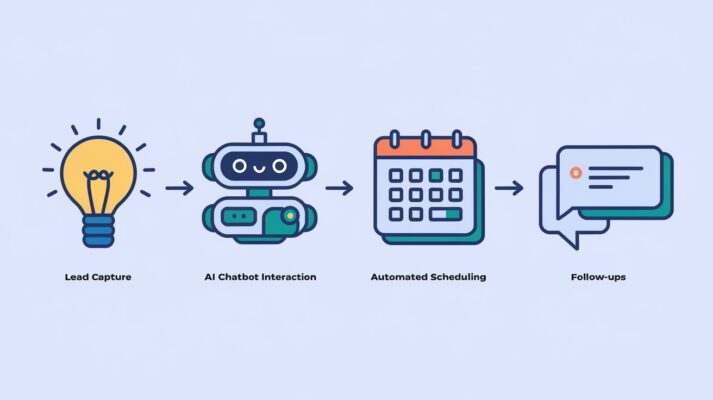Artificial Intelligence (AI) chatbots are revolutionizing the real estate industry by enhancing how realtors interact with clients, manage leads, and streamline operations. This comprehensive guide explores the benefits, implementation strategies, challenges, success stories, and future trends of AI chatbots in real estate, providing valuable insights for realtors aiming to leverage this technology.
Benefits of AI Chatbots for Realtors
1. 24/7 Client Engagement
AI chatbots ensure continuous availability, allowing potential clients to receive immediate responses to their inquiries at any time. This constant accessibility enhances client satisfaction and prevents the loss of leads due to delayed responses.
2. Efficient Lead Generation and Qualification
By engaging website visitors in real-time, chatbots can ask pertinent questions to qualify leads, gather essential information, and prioritize prospects based on their readiness to buy or sell. This automation streamlines the lead management process, enabling realtors to focus on high-potential clients.
3. Personalized Client Interactions
Advanced AI chatbots analyze user behavior and preferences to offer tailored property recommendations, schedule viewings, and provide detailed information about listings. This personalization enhances the client experience and increases the likelihood of successful transactions.
4. Time and Resource Optimization
By handling routine inquiries and administrative tasks, chatbots free up valuable time for realtors, allowing them to concentrate on more critical activities such as negotiations and closing deals.
Implementing AI Chatbots: Best Practices
1. Define Clear Objectives
Establish specific goals for your chatbot, such as lead generation, customer support, or both. Clear objectives guide the development process and ensure the chatbot aligns with your business needs.
2. Choose the Right Platform
Select a chatbot platform that integrates seamlessly with your existing Customer Relationship Management (CRM) system and Multiple Listing Service (MLS). This integration ensures consistent data flow and a unified user experience.
3. Personalize the Chatbot Experience
Customize your chatbot’s responses to reflect your brand’s voice and cater to the unique aspects of your local real estate market. Personalization fosters trust and engagement with potential clients.
4. Regularly Update Information
Keep your chatbot’s data current with the latest property listings, market trends, and neighborhood information. Regular updates ensure the chatbot provides accurate and relevant information to users.
5. Facilitate Seamless Human Handoff
Design your chatbot to recognize complex inquiries that require human intervention and ensure a smooth transition to a human agent. This capability maintains the quality of customer service and addresses client needs effectively.
Challenges in Implementing AI Chatbots
1. Data Privacy and Security
Handling sensitive client information necessitates robust security measures and compliance with data protection regulations to maintain trust and avoid legal issues.
2. Technical Integration
Ensuring that the chatbot integrates smoothly with existing systems can be technically challenging and may require specialized expertise.
3. Maintaining a Personal Touch
Balancing automation with the personalized service that clients expect in real estate transactions is crucial to prevent interactions from feeling impersonal.
Success Stories: AI Chatbots in Real Estate
1. JLL’s AI Implementation
JLL, a global commercial real estate firm, developed an AI model that significantly reduced the time required for drafting partnership memorandums—from several weeks to just hours. This efficiency showcases AI’s potential in streamlining complex processes.
2. Barry Plant’s ‘Grace’ AI Bot
Australian real estate agency Barry Plant introduced ‘Grace,’ an AI bot designed to interact with prospective buyers and tenants, craft listing descriptions, and respond to inquiries around the clock. This innovation demonstrates AI’s capability to enhance customer engagement and operational efficiency.
3. reAlpha’s ‘Claire’ AI Assistant
reAlpha, a real estate technology company, launched ‘Claire,’ an AI-powered, zero-commission smart buyer’s agent. Claire assists homebuyers with property searches, booking tours, submitting offers, and negotiating terms, simplifying the home-buying process through AI-driven workflows and a conversational interface.
Future Trends in AI Chatbots for Real Estate
1. Advanced Natural Language Processing (NLP)
Future chatbots will possess enhanced NLP capabilities, enabling more human-like and intuitive conversations with clients.
2. Integration with Virtual and Augmented Reality
AI chatbots will increasingly integrate with virtual and augmented reality technologies to provide immersive property tours and interactive experiences, offering clients a more comprehensive view of properties remotely.
3. Predictive Analytics for Market Trends
AI chatbots will utilize predictive analytics to forecast market trends and property values, providing realtors and clients with data-driven insights for informed decision-making.
4. Voice-Activated Assistants
The adoption of voice-activated AI assistants will enable clients to conduct property searches and receive information through voice commands, enhancing accessibility and convenience.
Conclusion: Embracing AI Chatbots in Real Estate
AI chatbots are transforming the real estate industry by enhancing client engagement, streamlining operations, and providing personalized experiences. By implementing AI chatbots thoughtfully and addressing potential challenges, realtors can leverage this technology to gain a competitive edge and meet the evolving expectations of clients.
Embracing AI chatbot technology is not just an investment in operational efficiency but also a commitment to providing exceptional client service in the digital age.
